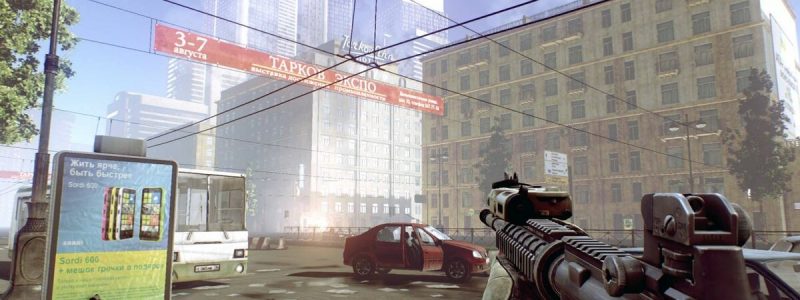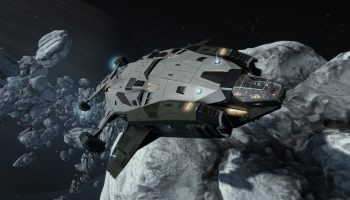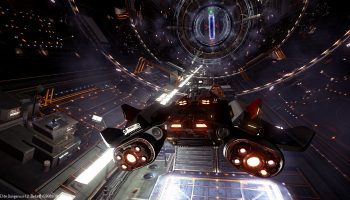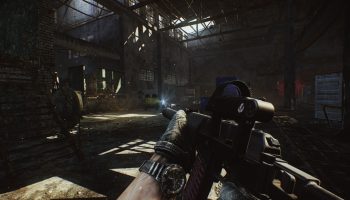Hello everyone. I noticed some newspaper clippings at the IC, and after a brief search, found no english translation posted, (or anyone asking for one for that matter). However, I'm bored, and decided I'll make one myself, since it's interesting lore as far as I'm concerned. Bear in mind, while I am a native Russian speaker, and a fluent English speaker (C2 level certified, TOEFL IBT 114/120), I am not a professional translator. There may be mistakes in this, but I'll try to carry over the meaning the best I can. Spelling on names is my best guess. Highlighted parts of the clipping are bolded. Bullet points are paragraphs. Italics are translator notes.
details the events leading up to what we're in right now (seemingly the Contract Wars period). It is not dated, however it can be inferred to have been written prior to 2016, as the Interior Troops referenced in the clipping were incorporated into the Russian National Guard that year.
It is likely that nobody will ever officially confirm this, but everyone understands by now that the PMC "BEAR" was most likely created with government support, (or by their direct order) as the only, seemingly, "symmetrical" response to the emergent threat. When a part of the country is essentially under occupation by an international contingent, and local police and law enforcement agencies are incapable of conducting unimpeded investigation without prior consent of foreign control commissions, a logical answer from the government would be a declaration of martial law. Since the enemies in this case would be not third world nations, but leading countries, who, apart from all else, are the main carriers of nuclear and other strategic weaponry, the outcome of such a confrontation is not difficult to imagine.
It is clear, considering the above, that the main actors in the conflict today are the private military companies. The "USEC" PMC, hired by the Terra Group under the passive protection of the peacekeeping contingent is actively impeding the official investigation of the actions of the corporate branch. According to the Russian special services, apart from concealing evidence and witnesses, the employees of this PMC are covering up the continuing, despite the injunctions, research in as yet undiscovered facilities. (Penciled in – Tarkov, 500-1000, illegible Cascade? Wind? Bear (circled).
The employees of the "BEAR" PMC, being private contractors of a regional public organization, essentially conduct combat operations on local scale in Tarkov, with the goal of locating direct or circumstantial evidence of illegal activities and turning it over to the authorities.
It must be noted that, according to the Russian legal code, the actions of any unofficial militarized groups on its territory are inherently illegal.
Today, two years after the beginning of the confrontation, it can be said that the current state of affairs doesn't look like the result of natural circumstance. More likely it seems to be a well and lengthily prepared military and political provocation. The only question that stands now is who and why would want to provoke Russia like this, and what is their end goal? (Penciled in – "Norvinsk – The Ministry" "either Russian KN or English ICH-49RVSN" – the likely in question; RVSN is the russian abbreviation of the Strategic Missile Forces, however I can't make sense of the connection. There is a 49th Guards Rocket Division, but it's a Belarussian unit, not Russian. It is possible I misread the handwriting. )
As a result, the situation that has formed as of today is that of a strange stalemate, looking like a layered cake. The peacekeeping contingent of the "blue helmets" is officially present in the key areas in the region, however they rarely appear outside their FOBs. The Finnish border as well as the sea border are still under control of the Russian Border Service, with the border guards de-facto having blocked all ways to the West. The sea border is regularly patrolled by warships of the Baltic Fleet, and Norvinsk's sole airport is non-functional, with its airspace under tight control of the local anti-aircraft position. The land border has been significantly strengthened by the Interior Troops. As a result, the peacekeepers, as well as the Terra Group Labs employees along with their PMC guards are cut off from the outside world, but, due to the presence of the UN contingent, the Russian authorities are unable to resolve the crisis by force. Thus, the only relatively peaceful resolution for the crisis can be achieved only through the actions of the employees of the BEAR PMC, as long as they can, in short order, find irrefutable evidence of a strategic threat posed by the foreign company, and provide it to the authorities.
Concerning the operational environment in the region, lately the points of conflict between PMCs have been shifting from the suburbs of Tarkov into the city proper. Looking at a map with the real situation as of today, one may note that groups of "BEAR" PMCs are slowly, but surely cutting the city off around its perimeter. By conducting operations in the port area (pencil illegible) and blocking the bridge connecting Tarkov to Norvinsk, the "bears" have prevented any evacuation of personnel of physical evidence by Terra Group Labs. Furthermore, the "bears" have destroyed several warehouses owned by the foreign company on the terminal territory, which stored ready to ship containers with unknown contents (arrow to pencil "BLUE ICE"and TG Labs logo). On the opposite side of the city, on the E-18 highway, the "bears" have located and destroyed a concealed communications center located in an abandoned lumber mill (the Woods map?). It was also made known that Terra Group Labs have bought out the reserve civil defense station previously owned by EMERCOM. According to latest reports, PMC clashes are still occurring in the area.
Overall, at the current rate, very soon "BEAR" PMC operatives will be able to block, or possibly even take over one of the key facilities under investigation – the former Chemical Plant Nr. 16 (the Factory map). The plant was illegaly sold to Terra Group Labs back in 2009 and what kind of work was being conducted on its grounds before the start of an armed conflict the authorities have as of yet been unable to find out. It is likely that a production facility, or possibly a laboratory existed there, which could serve as serious evidence to support the case of Terra Group Labs conducting illegal activity on Russian soil. Documents and digital data carriers can be easily destroyed, witnesses – silenced, but destroying a whole plant or laboratory in a way that would prevent investigators from finding out its purpose is unlikely. Furthermore, thanks to the previously cut off ways of egress and the established blockade, there is no way to extract any equipment.
Thus, very soon the situation around the armed conflict in the Norvinsk Oblast could drastically change, and when investigators, lawyers and politicians take over from armed fighters – stabilize completely.
talks about the Safe Sea and KerniSEC founders. Dated August 2011.
- In this issue we continue our story about the modern condottieri, and the history of the creation of the largest private armies of today and the operations conducted by them. Of course, in such stories there are many blank spaces, after all, neither the mercenaries themselves, nor their employers are in any hurry to share the details of their work, but, with some digging, certain details are uncovered.
- This time we will take a look at a well-known in certain circles private military comapny "USEC". The creation of this company is foremost associated with two names: the American businessman Brian Kernighan, and the British retired Royal Marines colonel John Berger.
- In the beginning of his career, Brian Kernighan had no connection to the armed forces. Having inherited his father's transportation business, he decided to take part in a risky, and thus lucrative business of carrying cargo across the Mexican border through the desert areas of the southern United States. As Kernighan himself said in one of his few interviews, he very soon realized that he has underestimated the danger of it – occasionally the trucks were attacked, or disappeared completely.
- That was when Kernighan thought of hiring armed guards, which allowed him to take on more expensive cargo, gaining higher profits. In time, the businessman realised that it is more profitable to form his own armed service, rather than pay someone else. Thus, professional mercenaries and armored trucks appeared in the employ of the company. It turned out that more often than not, his clients required escort, not transport, and Kernighan realized he needed to change his company's profile.
- However, as an experienced businessman, Kernighan quickly realized that without any experience in organizing military people he won't get far. Thus Kernighan decided to start his new business on a ready foundation – purchasing George Steiner's "Red Bird" company. Thus, "KerniSEC" is born, a future half of "USEC"
- Not much is known about George Steiner himself. A retired US Army brigadier general, Gulf War veteran, now operational director of "USEC", board member. He became a co-owner of "Red Bird" in 1994, at an invitation from an Army friend. For a time, the company competed well on the market, but after the death of the founder it ended up under Steiner's complete control, who turned out to be, if not a bad military officer, but a poor businessman. Soon "Red Bird" fell into decline, and was purchased by Kernighan at a bargain price, considering it had a decent complement of employees, vehicles, and training facilities.
- The second figure in the founding of "USEC" is "sea wolf" John Berger. Retired Royal Marines colonel, Gulf War veteran, cavalier of several orders. Some years ago John Berger gave an interview to our colleagues from a popular British publication, so his biography is reasonably well-known, as long as you believe his own words.
- In 1994, having retired, the former combat officer quickly got bored. One day, a former military colleague told his in a pub that for two years he's been doing mercenary work on British ships passing near Somalia as armed escort. The work was easy, the pay was good – Berger was convinced.
- However, the colonel didn't get as lucky as his friend – the ship was attacked on the first voyage, and Berger, armed with only a revolver, could do nothing to stop it.
- The failure, however, only fired Berger up. After returning to England he again hires on as a guard, but this time accompanied by several other former military personnel and with much better armament.
- Fate challenges Berger again – the pirates attack, but now he is ready. The attack was repulsed. Upon coming back home, Berger immediately creates a company specializing in armed escort of shipments, "Safe Sea" – future other half of "USEC".
talks about USEC formation and history. It is dated August 2011.
- The quick rise of "Safe Sea" is tied in many way to one interesting figure – the former British official turned development director of "USEC", the gray cardinal on the company board, Ronald Henry Hunt. Berger himself have described their meeting as completely coincidental, having happened in 1998 on a sea cruise.
- Whatever the case, their acquaintance have turned out to be fruitful – immediately afterwards "Safe Sea" obtains a lucrative government contract, and a year later Hunt leaves his government job, becoming Berger's business partner.
- Rumor has it Ronald Hunt was the one to convince Berger to move up to a new international level of operation and organized talks on the merger with "KerniSEC". In any case, the talks are successful, and in 1999 "United Security" is formed.
- Kernighan's business sense, Steiner's combat experience, Berger's organizational skills and Hunt's diplomatic know-how bear their fruit – the newly formed company does well, with British government contracts giving it credence. Soon enough "USEC" attracts the attention of the Pentagon, after all the new war with Hussein required manpower.
- However, in Iraq "USEC" was only one of many PMC's present and it is impossible to tell what exactly the company did there. In any case no large-scale scandals were caused by it, unlike certain other mercenary firms (reference to Blackwater?).
- A new round of development for the company came in 2007 when "USEC" became closely working with the international holding "Terra Group". Rumour has is the connection with such a large client came from an unexpected source – George Steiner, who previously took no part in company development, handling only the military side of things.
- However, working with Terra Group brought the company not just a rise, but a bad rep. Contracts from obstructed often turned into USEC-related scandals obstructed international, as, for example, in the Democratic Republic of Congo in 2009. Usually, such obstructed were connected to the person of one Hans van obstructed – a former "green beret" turned director of USEC special operations department, likely conducting "unconventional" missions for the company.
- As it stands, USEC has essentially turned into a private guard of the "Terra group" holding, and one with a controversial reputation. Whether Kernighan and Berger had made the right choice, or this is the beginning of the end for once glorious company – only time will tell.
details a legal controversy surrounding a corrupt Norvinsk government official giving away government facilities, through TARBank likely to Terra Group. Not dated. Titled – TARBank's Dark Deeds.
- No criminal case will be opened against deputy minister of the economy of Norvinsk Oblast'.
- We remind you that in May this year the prosecutor's office has begun a series of checks concerning the legality of the privatization of several industrial areas of Tarkov trade port. In the office's opinion, deputy minister of the economy Shkurenko has personally signed a series of documents which de-facto gave away government land to interested parties with no bidding, causing over 100million roubles of damage to the Oblast'.
- At the same time, at the governor's behest a government commission was created, which ruled that Shkurenko was innocent and the situation surrounding the port is a result of inconsistency between several regulations on land privatization connected to the provision of the status of a free economic zone to the Oblast'.
- Nonetheless, the commission's ruling carries no legal power and remains a recommendation only, so the investigation continued.
- Now new details of the case have appeared. It was made known that yesterday the investigative authority received new documents confirming that the privatization was carried out according to regulation and bidding had taken place. TARBank is now the legal owner of the contested territories, and the legal entities previously featured in the investigation as the owners were merely renting the area from the owner.
- Our question as to where said documents were previously was answered by a ministry representative in a phone call. Supposedly, the documents were lost in the bureaucracy, and the whole story is no more than a misunderstanding.
- Neither Shkurenko himself nor TARBank representatives have agreed to comment.
So, there's that. Hopefully that was as interesting to y'all as it was to me, just a little bit of extra light shone on the lore surrounding EFT.







